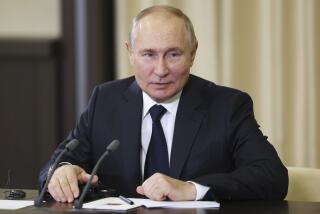Kazakhstan’s Leader Extols China Ties : Asia: Tereschenko, visiting Beijing, discounts any future spread of Islamic fundamentalism from his republic to Muslims in Xinjiang.
- Share via
BEIJING — Prime Minister Sergei Tereschenko of Kazakhstan said here Wednesday that his newly independent nation is quickly establishing good-neighbor relations and expanded economic ties with China.
He played down any possibility that Islamic fundamentalism will spread from his republic across its 1,000-mile border with China into the Xinjiang region, which has large and restless Muslim minority populations. He said China has been invited to establish stores in Kazakhstan selling consumer goods and that cross-border travel is being made easier.
But Tereschenko reiterated that Kazakhstan will not readily give up the nuclear missile arsenal it inherited from the old Soviet Union. Although the weapons are still under joint control with Moscow, Kazakhstan has on its territory missiles that make it one of the globe’s larger nuclear powers.
The missiles eventually will be eliminated, but “we need time and finance, and we need international guarantees of non-use of nuclear weapons against Kazakhstan,” he said.
Beijing and the Alma-Ata government, which is still controlled by former Communists, have moved rapidly to set up solid international ties. A trade agreement was signed in mid-December and diplomatic relations were established Jan. 3. Tereschenko said a Beijing embassy will open soon.
During his visit here, Tereschenko met with President Yang Shangkun, Communist Party General Secretary Jiang Zemin and Premier Li Peng for talks in which both sides stressed their friendship. But there is no guarantee that relations will always remain so smooth. The existence of independent Central Asian nations with Muslim majorities inevitably complicates Beijing’s efforts to retain control over the Uighurs, Kazakhs and other Muslims of Xinjiang.
Tereschenko confirmed that Kazakhstan is encouraging ethnic Kazakhs from around the world to return home; about 5,000 have already done so, he said.
He declared that Kazakhstan will not encourage the growth of Muslim religious activities across the border in China. “The Kazakh people are not so much Islamic,” insisted Tereschenko, himself an ethnic Russian. Kazakhs, traditionally Muslims, make up 42% of the republic’s population, while 39% of its citizens are Russian.
Not everyone agrees with Tereschenko’s view on religion.
Alexander Lukin, a Moscow City Council member and former Soviet diplomat in Beijing interviewed last month by the Hong Kong Standard, was quoted as saying: “The influence of Islam is very strong in the Central Asian states like Uzbekistan and Kazakhstan. We cannot be sure of the future developments, but the Chinese are really worried about the possibility of Muslims coming to power, like we are seeing now in Algeria.”
Lukin said China “wants to see stability in these republics,” while Kazakhstan’s leaders “are interested in following China’s path of radical economic reform without changing the political structure.” Thus, Alma-Ata and Beijing share an interest in expanded economic cooperation that might help prevent political upheavals on both sides of the border.
More to Read
Sign up for Essential California
The most important California stories and recommendations in your inbox every morning.
You may occasionally receive promotional content from the Los Angeles Times.













